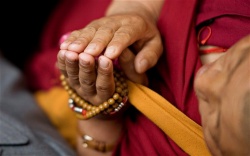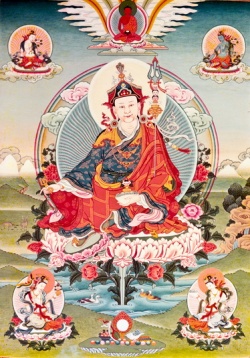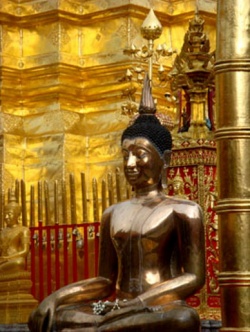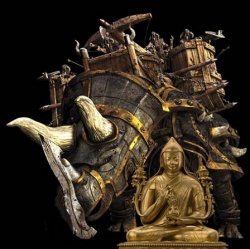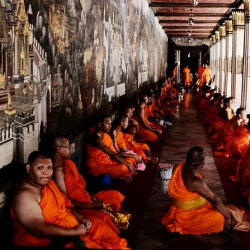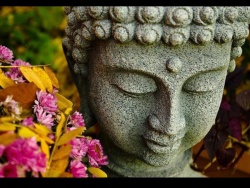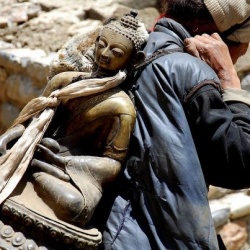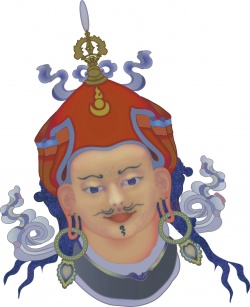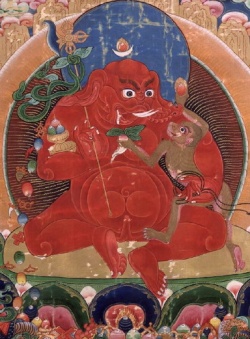More Questions & Answers on Buddhism
Distinguishing Good and Evil
The problems of good and evil, right and wrong, have been dealt with in the discussion on karma. Here it may suffice to give a brief summary on the subject.
To determine whether an action is good or evil, right or wrong, Buddhist ethics takes into account three components involved in a karmic action. The first is the intention that motivates the action, the second is the effect the doer experiences consequent to the action, and the third is the effect that others experience as a result of that action. If the intention is good, rooted in positive mental qualities such as love, compassion, and wisdom, if the result to the doer is wholesome (for instance, it helps him or her to become more compassionate and unselfish), and if those to whom the action is directed also experience a positive result thereof, then that action is good, wholesome, or skillful (kusala). If, on the other hand, the action is rooted in negative mental qualities such as hatred and selfishness, if the outcome experienced by the doer is negative and unpleasant, and if the recipients of the action also experience undesirable effects from the action or become more hateful and selfish, then that action is unwholesome or unskillful (akusala).
It is quite probable that on the empirical level an action may appear to be a mixture of good and bad elements, in spite of the intention and the way it is performed. Thus, an action committed with the best of intentions may not bring the desired result for either the doer or the recipient. Sometimes an action based on negative intentions may produce seemingly positive results (as stealing can produce wealth). Due to lack of knowledge and understanding, people may confuse one set of actions with an unrelated set of results and make wrong conclusions, or simply misjudge them on account of social values and conventions. This can lead to misconceptions about the law of karma and loss of moral consciousness. This is why precepts are necessary in the practice of moral discipline: they provide definite guidelines and help to avoid some of the confusion that empirical observation and social conventions may entail.
Buddhist moral precepts are based on the Dharma, and they reflect such eternal values as compassion, respect, self-restraint, honesty, and wisdom. These are values that are cherished by all civilizations, and their significance is universally recognized. Moral precepts that are based on such values or directed toward their realization will always be relevant to human society, no matter to what extent it has developed. Moreover, their validity can be empirically tested on the basis of one's own sensitivity and conscience, which are beyond factors of time and place. Killing, for instance, is objectionable when considered from the perspective of oneself being the victim of the action (although when other lives are subjected to the same act, its undesirability may not be felt as strongly). The same is true with regard to stealing, lying, and sexual misconduct. Because Buddhist moral precepts are grounded on these factors, their practicality remains intact even today, and their usefulness is beyond question.
Buddhist Views on Marriage
In Buddhism, marriage is regarded as entirely a personal, individual concern and not as a religious duty.
Marriage is a social convention, an institution created by man for the well-being and happiness of man, to differentiate human society from animal life and to maintain order and harmony in the process of procreation. Even though the Buddhist texts are silent on the subject of monogamy or polygamy, the Buddhist laity is advised to limit themselves to one wife. The Buddha did not lay rules on married life but gave necessary advice on how to live a happy married life. There are ample inferences in His sermons that it is wise and advisable to be faithful to one wife and not to be sensual and to run after other women. The Buddha realised that one of the main causes of man’s downfall is his involvement with other women (Parabhava Sutta). Man must realise the difficulties, the trials and tribulations that he has to undergo just to maintain a wife and a family. These would be magnified many times when faced with calamities. Knowing the frailties of human nature, the Buddha did, in one of His precepts, advise His followers of refrain from committing adultery or sexual misconduct.
The Buddhist views on marriage are very liberal: in Buddhism, marriage is regarded entirely as personal and individual concern, and not as a religious duty. There are no religious laws in Buddhism compelling a person to be married, to remain as a bachelor or to lead a life of total chastity. It is not laid down anywhere that Buddhists must produce children or regulate the number of children that they produce. Buddhism allows each individual the freedom to decide for himself all the issues pertaining to marriage. It might be asked why Buddhist monks do not marry, since there are no laws for or against marriage. The reason is obviously that to be of service to mankind, the monks have chosen a way of life which includes celibacy. Those who renounce the worldly life keep away from married life voluntarily to avoid various worldly commitments in order to maintain peace of mind and to dedicate their lives solely to serve others in the attainment of spiritual emancipation.
Divorce
Separation or divorce is not prohibited in Buddhism though the necessity would scarcely arise if the Buddha’s injunctions were strictly followed. Men and women must have the liberty to separate if they really cannot agree with each other. Separation is preferable to avoid miserable family life for a long period of time. The Buddha further advises old men not to have young wives as the old and young are unlikely to be compatible, which can create undue problems, disharmony and downfall (Parabhava Sutta).
A society grows through a network of relationships which are mutually inter-twined and inter-dependent. Every relationship is a whole hearted commitment to support and to protect others in a group or community. Marriage plays a very important part in this strong web of relationships of giving support and protection. A good marriage should grow and develop gradually from understanding and not impulse, from true loyalty and not just sheer indulgence. The institution of marriage provides a fine basis for the development of culture, a delightful association of two individuals to be nurtured, and to be free from loneliness, deprivation and fear. In marriage, each partner develops a complementary role, giving strength and moral courage to one another, each manifesting a supportive and appreciative recognition of the other’s skills. There must be no thought of either man or woman being superior, each is complementary to the other, a partnership of equality, exuding gentleness, generosity, calm and dedication.
Birth Control and Abortion
Although man has freedom to plan his family according to his own convenience, abortion is not justifiable.
There is no reason for Buddhists to oppose birth control. They are at liberty to use any of the old or modern measures to prevent conception. Those who object to birth control by saying that it is against God’s law to practise it, must realise that their concept regarding this issue is not reasonable. In birth control what is done is to prevent the coming into being of an existence. There is no killing involved and there is no akusala (bad) karma. But if they take any action to have an abortion, this action is wrong because it involves taking away or destroying a visible or invisible life. Therefore, abortion is not justifiable.
According to the Teachings of the Buddha, five conditions must be present to constitute the evil act of killing. They are:
- 1) a living being
- 2) knowledge or awareness it is a living being
- 3) intention of killing
- 4) effort to kill, and
- 5) consequent death
When a female conceives, there is a being in her womb and this fulfils the first condition. After a couple of months, she knows that there is a new life within her and this satisfies the second condition. Then for some reason or other, she wants to do away with this being in her. So she begins to search for an abortionist to do the job and in this way, the third condition is fulfilled. When the abortionist does his job, the fourth condition is provided for and finally, the being is killed because of that action. So all the conditions are present. In this way, there is a violation of the First Precept - not to kill, and this is tantamount to killing a human being. According to Buddhism, there is no ground to say that we have the right to take away the life of another.
Under certain circumstances, people feel compelled to do that for their own convenience. But they should not justify this act of abortion as somehow or other they will have to face some sort of bad karmic results. In certain countries abortion is legalised, but this is to overcome some problems. Religious principles should never be surrendered for the pleasure of man. They stand for the welfare of the whole mankind.
Committing Suicide
Taking one’s own life under any circumstances is morally and spiritually wrong. Taking one’s own life owing to frustration or disappointment only causes greater suffering. Suicide is a cowardly way to end one’s problems of life. A person cannot commit suicide if his mind is pure and tranquil. If one leaves this world with a confused and frustrated mind, it is most unlikely that he would be born again in a better condition. Suicide is an unwholesome or unskilful act since it is encouraged by a mind filled with greed, hatred and delusion. Those who commit suicide have not learnt how to face their problems, how to face the facts of life, and how to use their mind in a proper manner. Such people have not been able to understand the nature of life and worldly conditions.
Some people sacrifice their own lives for what they deem as a good and noble cause. They take their own life by such methods as self-immolation, bullet-fire, or starvation. Such actions may be classified as brave and courageous. However, from the Buddhist point of view, such acts are not to be condoned. The Buddha has clearly pointed out that the suicidal states of mind lead to further suffering.
Why Does the World Population Increase?
There is really no ground to think that this is the only period in which the population of the world has increased.
If Buddhists do not believe in the soul created by god, how are they going to account for the increase of population in the world today? This is a very common question that is asked by many people today. People who ask this question usually assume that there is only one world where living beings exist. One must consider that it is quite natural for the population to increase in such places where good climatic conditions, medical facilities, food and precautions are available to produce and to protect living beings.
One must also consider that there is really no ground to think that this is the only period in which the population in the world has increased. There are no means of comparison with any period of ancient history. Vast civilisations existed and have disappeared in Central Asia, the Middle East, Africa and Ancient America. No census figures on these civilisations are even remotely available. Population, as everything else in the universe, is subject to cycles of rise and fall. In cycles of alarming increases of birth rate, one might be consequently tempted to argue against rebirth in this or other worlds. For the last few thousand years, there has been no evidence to prove that there were more people in some parts of the world than there are today. The number of beings existing in the various world systems is truly infinite. If human lives can be compared to only one grain of sand, the number of beings in the universe is like the grains of sand of all the beaches in the world. When conditions are right and when supported by their good karma, a few of these infinite number of beings are reborn as human beings. The advancement of medicine especially in the 19th and 20th centuries has enabled human beings to live longer and healthier lives.
This is a factor that contributes to population increase. Population can further increase unless sensible people take measures to control it. Hence, the credit or responsibility of increasing the population must be given to medical facilities and other circumstances available today. This credit or responsibility cannot be allotted to any particular religion or any external sources.
There is a belief among certain people that all unfortunate occurrences that destroy human lives are created by god in order to reduce the population of the world. Instead of giving so much suffering to his own creatures, why cannot he control the population? Why does he create more and more people in thickly populated countries where there is no proper food, clothing and other basic and necessary requirements? Those who believe that god created everything cannot give a satisfactory answer to this question. Poverty, unhappiness, war, hunger, disease, famine are not due to the will of god or to the whim of some devil, but to causes which are not so difficult to discover.
War And Peace
Why is there no Peace?
Man has forgotten that he has a heart. He forgets that if he treats the world kindly, the world will treat him kindly in return.
We are living in a world of really amazing contradictions. On the one hand, people are afraid of war; on the other hand, they prepare for it with frenzy. They produce in abundance, but they distribute miserly. The world becomes more and more crowded, but man becomes increasingly isolated and lonely. Men are living close to each other as in a big family, but each individual finds himself more than ever before, separated from his neighbour. Mutual understanding and sincerity are lacking very badly. One man cannot trust another, however good the latter may be.
When the United Nations was formed after the horrors of the Second World War, the heads of Nations who gathered to sign the charter agreed that it should begin with the following preamble: ‘Since it is in the minds of men that wars begin, it is in the minds of men the ramparts of peace should be erected.’. This very same sentiment is echoed in the first verse of the Dhammapada which states: ‘All(mental)states have mind as their forerunner, mind is their chief, and they are mind-made. If one speaks or acts, with a defiled mind, suffering follows one even as the wheel follows the hoof of the draught-ox’.
The belief that the only way to fight force is by applying more force has led to the arms race between the great powers. And this competition to increase the weapons of war has brought mankind to the very brink of total self-destruction. If we do nothing about it, the next war will be the end of the world where there will be neither victors nor victims, only dead bodies.
‘Hatred does not cease by hatred; by love alone does it cease’. Such is the Buddha’s advice to those who preach the doctrine of antagonism and ill-will, and who set men to war and rebellion against one another. Many people say that the Buddha’s advice to return good for evil is impracticable. Actually, it is the only correct method to solve any problem. This method was introduced by the great Teacher from His own experience. Because we are proud and egoistic, we are reluctant to return good for evil, thinking that the public may treat us as cowardly people. Some people even think that kindness and gentleness are effeminate, not ‘macho’! But what harm is there if we settle our problems and bring peace and happiness by adopting this cultured method and by sacrificing our dangerous pride?
Tolerance must be practised if peace is to come to this earth. Force and compulsion will only create intolerance. To establish peace and harmony among mankind, each and everyone must first learn to practise the ways leading to the extinction of hatred, greed and delusion, the roots of all evil forces. If mankind can eradicate these evil forces, tolerance and peace will come to this restless world.
Today the follows of the most compassionate Buddha have a special duty to work for the establishment of peace in the world and to show an example to others by following their Master’s advice: ‘All tremble at punishment, all fear death; comparing others with oneself, one should neither kill nor cause to kill’ (Dhammapada 129) .
Peace is always obtainable. But the way to peace is not only through prayers and rituals. Peace is the result of man’s harmony with his fellow beings and with his environment. The peace that we try to introduce by force is not a lasting peace. It is an interval in between the conflict of selfish desire and worldly conditions.
Peace cannot exits on this earth without the practice of tolerance. To be tolerant, we must not allow anger and jealousy to prevail in our mind. The Buddha says, ‘No enemy can harm one so much as one’s own thoughts of craving, hate and jealousy’ (Dhammapada 42).
Buddhism is a religion of tolerance because it preaches a life of self-restraint. Buddhism teaches a life based not on rules but on principles. Buddhism has never persecuted or maltreated those whose beliefs are different. The Teaching is such that it is not necessary for anyone to label himself as a Buddhist to practise the Noble Principles of this religion.
The world is like a mirror and if you look at the mirror with a smiling face, you can see your own, beautiful smiling face. On the other hand, if you look at it with a long face, you will invariably see ugliness. Similarly, if you treat the world kindly the worldly will also certainly treat you kindly. Learn to be peaceful with yourself and the world will also be peaceful with you.
Man’s mind is given to so much self-deceit that he does not want to admit his own weakness. He will try to find some excuse to justify his action and to create an illusion that he is blameless. If a man really wants to be free, he must have the courage to admit his own weakness. The Buddha says:--
‘Easily seen are other’s faults; hard indeed it is to see one’s own faults’
Can We Justify War?
The difference between a dog fight and a war or between two groups of people is only in its organisation.
The history of mankind is a continuous manifestation of man’s greed, hatred, pride, jealousy, selfishness and delusion. During the last 3,000 years, men have fought 15,000 major wars. Is it a characteristic of man? What is his destiny? How can men bring destruction to one another?
Although men have discovered and invented many important things, they have also made great advances towards the destruction of their own kind. This is how many human civilisations have been completely erased from this earth. Modern man has become so sophisticated in his art and techniques of warfare that it is now possible for him to turn the whole of mankind into ashes within a few seconds. The world has become a storehouse of military hardware as a result of a little game called ‘Military Superiority’.
We are told that the prototype of a nuclear weapon is more powerful than the atomic bomb which was dropped at Hiroshima Japan in August, 1945 is being planned. Scientist believe that a few hundred thermonuclear weapons will chart the course towards universal destruction. Just see what we are doing to our human race! Think what sort of scientific development it is! See how foolish and selfish man is!
Man should not pander to his aggressive instincts. Man should uphold the ethical teachings of the religious teachers and display justice with morality to enable peace to prevail.
Treaties, pacts and peace formulae have been adopted and millions of words have been spoken by countless world leaders throughout the world who proclaim that they have found the way to maintain and promote peace on earth. But for all their efforts, they have not succeeded in removing the threat to man-kind. The reason is that we have all failed to educate our young to truly understand and respect the need for selfless service and the danger of selfishness. To guarantee true peace, we must use every method available to us to educate our young to practise love, goodwill and tolerance towards others.
The Buddhist Attitude
A Buddhist should not be the aggressor even in protecting his religion or anything else. He must try his best to avoid any kind of violent act. Sometimes he may be forced to go to war by others who do not respect the concept of the brotherhood of man as taught by the Buddha. He may be called upon to defend his fellow men from aggression, and as long as he has not renounced the worldly life, he is duty-bound to join in the struggle for peace and freedom. Under these circumstances, he cannot be blamed for his action in becoming a soldier or being involved in defence. However, if everyone were to follow the advice of the Buddha, there would be no reason for war to take place in this world. It is the duty of every cultured man to find all possible ways and means to settle disputes in a peaceful manner, without declaring war to kill his fellow men. The Buddha did not teach His followers to surrender to any form of evil power, be it man or supernatural being.
Indeed, with reason and science, man could conquer nature, and yet man has not yet even secured his own life. Why is it that life is in danger? While devoted to reason and being ruled by science, man has forgotten that he has a heart which has been neglected and has been left to wither and be polluted by passion.
If we cannot secure our own lives, then how can world peace be possible? To obtain peace, we must train our minds to face facts. We must be objective and humble. We must realise that no one person, nor one nation is always wrong. To obtain peace, we must also share the richness of the earth, not necessarily with equality but at least with equity. There can never be absolute equality but surely there can be a greater degree of equity.
It is simply inconceivable that five percent of the world’s population should enjoy fifty percent of the its wealth, or that twenty-five percent of the world should be fairly well-fed and some overfed, while seventy-five percent of the world is always hungry. Peace will only come when nations are willing to share and share equitably, the rich to help the poor and the strong to help the weak, thus creating international goodwill. Only if and when these conditions are met, can we envision a world with no excuse for wars.
The madness of the armaments race must stop! We must try to build schools instead of cruisers, hospitals instead of nuclear weapons. The amount of money and human lives that various governments waste in the battlefield should be diverted to build up the economics to elevate the standard of living.
The world cannot have peace until men and nations renounce selfish desires, give up racial arrogance, and eradicate egoistic lust for possession and power. Wealth cannot secure happiness. Religion alone can effect the necessary change of heart and bring about the only real disarmament - that of the mind.
All religions teach people not to kill; but unfortunately this important precept is conveniently ignored. Today, with modern armaments, man can kill millions within one second, that is, more than primitive tribes did in a century.
Very unfortunately some people in certain countries bring religious labels, slogans and banners into their battlefields. They do not know that they are disgracing the good name of religion.
‘Verily, O monk,’ said the Buddha, ‘due to sensuous craving, kings fight with kings, princes with princes, priests with priests, citizens with citizens, the mother quarrels with the son, the son quarrels with the father, brother with brother, brother with sister, sister with brother, friend with friend’. (Majjhima Nikaya)
We can happily say that for the last 2,500 years there has never been any serious discord or conflict created by Buddhists that led to war in the name of this religion. This is a result of the dynamic character of the concept of tolerance contained in the Buddha’s teaching.
Can a Buddhist Join the Army?
You can be a soldier of Truth, but not the aggressor.
One day, Sinha, the general of the army, went to the Buddha and said, ‘I am a soldier, O Blessed One. I am appointed by the King to enforce his laws and to wage his wars. The Buddha teaches infinite love, kindness and compassion for all sufferers: Does the Buddha permit the punishment of the criminal? And also, does the Buddha declare that it is wrong to go to war for the protection of our homes, our wives, our children and our property? Does the Buddha teach the doctrine of complete self-surrender? Should I suffer the evil-doer to do with what he pleases and yield submissively to him who threatens to take by violence what is my own? Does the Buddha maintain that all strife including warfare waged for a righteous cause should be forbidden?’
The Buddha replied, ‘He who deserves punishment must be punished. And he who is worthy of favour must be favoured. Do not do injury to any living being but be just, filled with love and kindness’. These injunctions are not contradictory because the person who is punished for his crimes will suffer his injury not through the ill-will of the judge but through the evil act itself. His own acts have brought upon him the injury that the executors of the law inflict. When a magistrate punishes, he must not harbour hatred in his heart. When a murderer is put to death, he should realise that his punishment is the result of his own act. With his understanding, he will no longer lament his fate but can console his mind. And the Blessed One continued, ‘The Buddha teaches that all warfare in which man tries to slay his brothers is lamentable. But he does not teach that those who are involved in war to maintain peace and order, after having exhausted all means to avoid conflict, are blameworthy’.
‘Struggle must exist, for all life is a struggle of some kind. But make certain that you do not struggle in the interest of self against truth and justice. He who struggles out of self-interest to make himself great or powerful or rich or famous, will have no reward. But he who struggles for peace and truth will have great reward; even his defeat will be deemed a victory.
‘If a person goes to battle even for a righteous cause, then Sinha, he must be prepared to be slain by his enemies because death is the destiny of warriors. And should his fate overtake him, he has no reason to complain. But if he is victorious his success may be deemed great, but no matter how great it is, the wheel of fortune may turn again and bring his life down into the dust. However, if he moderates himself and extinguishes all hatred in his heart, if he lifts his down-trodden adversary up and says to him, ‘Come now and make peace and let us be brothers’, then he will gain a victory that is not a transient success; for the fruits of that victory will remain forever.
‘Great is a successful general, but he who conquers self is the greater victor. This teaching of conquest of self, Sinha, is not taught to destroy the lives of others, but to protect them. The person who has conquered himself is more fit to live, to be successful and to gain victories than is the person who is the slave of self. The person whose mind is free from the illusion of self, will stand and not fall in the battle of life. He whose intentions are righteousness and justice, will meet with no failure. He will be successful in his enterprise and his success will endure. He who harbours love of truth in his heart will live and not suffer, for he has drunk the water of immortality. So struggle courageously and wisely. Then you can be a soldier of Truth’.
There is no justice in war or violence. When we declare war, we justify it, when others declare war, we say, it is unjust. Then who can justify war? Man should not follow the law of the jungle to overcome human problems.
Mercy Killing
Mercy and Killing can never go together.
According to Buddhism mercy killing cannot be justified. Mercy and killing can never go together. Some people kill their pets on the grounds that they do not like to see the pets suffer. However, if mercy killing is the correct method to be practised on pets and other animals, then why are people so reluctant to do the same to their beloved ones?
When some people see their dogs or cats suffer from some skin disease, they arrange to kill those poor animals. They call this action, mercy killing. Actually it is not that they have mercy towards those animals, but they kill them for their own precaution and to get rid of an awful sight. And even if they do have real mercy towards a suffering animal, they still have no right to take away its life. No matter how sincere one may be, mercy killing, is not the correct approach. The consequences of this killing, however, are different from killing with hatred towards the animal. Buddhists have no grounds to say that any kind of killing is justified.
Some people try to justify mercy killing with the misconception that if the motive or reason is good, then the act itself is good. They then claim that by killing their pet, they have the intention to relieve the unhappy animal from its suffering and so the action is good. No doubt their original intention or motive is good. But the evil act of killing which occurs through a later thought, will certainly bring about unwholesome results.
Keeping away from mercy killing can become a nuisance to many. Nevertheless, the Buddhist religion cannot justify mercy killing as completely free from bad reaction. However, to kill out of necessity and without any anger or hatred has less bad reaction than to kill out of intense anger or jealousy.
On the other hand, a being (man or animal) may suffer owing to his bad karma. If By mercy killing, we prevent the working out of one’s bad karma, the debt will have to be paid in another existence. As Buddhists, all that we can do is to help to reduce the pain of suffering in others.
Killing for Self Protection
The Buddha has advised everyone to abstain from killing. If everybody accepts this advice, human beings would not kill each other. In the case where a person’s life is threatened, the Buddha says even then it is not advisable to kill out of self-protection. The weapon for self-protection is loving-kindness. One who practises this kindness very seldom comes across such misfortune. However, man loves his life so much that he is not prepared to surrender himself to others; in actual practice, most people would struggle for self-protection. It is natural and every living being struggles and kills others for self-protection but kammic effect depends on their mental attitude. During the struggle to protect himself, if he happens to kill his opponent although he has no intention to kill, then he is not responsible for that action. On the other hand, if he kills another person under any circumstances with the intention to kill, then he is not free from the kammic reaction; he has to face the consequences. We must remember that killing is killing; when we disapprove of it, we call it murder. When we punish man for murdering, we call it ‘capital punishment’. If our own soldiers are killed by an enemy we call it ‘slaughter’. However, if we approve a killing, we call it war. But if we remove the emotional content from these words, we can understand that killing is killing.
In recent years many scientists and some religionists have used the expressions like ‘humane killing’, ‘mercy killing’, ‘gentle killing’ and ‘painless killing’ to justify the ending of a life. They argue that if the victim feels no pain, if the knife is sharp, killing is justified. Buddhism can never accept these arguments because it is not how the killing occurs that is important, but the fact that a life of one being is terminated by another. No one has any right to do that for whatever reason.
Stealing from the Rich to Feed the Poor
Helping the poor is a commendable effort, but stealing from the rich to fulfill that commitment can hardly be justified. If this were made into a standard practice, society would be in turmoil. Rights of possession would be ignored, and stealing would become the accepted norm. Finally, the practice would defeat itself, and thievery would be recognized as a charitable act. This is hardly a desirable state of affairs; it is something not even remotely resembling a moral condition.
One of the distinct features of the Buddhist moral precepts is the universal character in which they may be practiced with benefit by all members of society. For instance, non-stealing (second precept) can be universally observed with desirable results, and the practice will help to promote coexistence, peace, and harmony in society. If this precept were reversed and stealing were made a moral principle, we can immediately see that there would be so much conflict and confusion that society would eventually cease to function. Thus, stealing can never be made a moral act, no matter how ideal and noble the motivation.
Extramarital Sex
This is a rather complex issue involving ramifications in emotional, social, and moral fields. The problem is a cause for concern in modern times, especially in the West where materialism has for so long been the philosophy of life.
The third moral precept advises against all forms of sexual misconduct, which include rape, adultery, promiscuity, paraphilia, and sexual perversions. Actually, the Buddhist commentary emphasizes adultery more than anything else, but if we take into account the purpose and intention of the precept, it is clear that the precept is intended to cover all improper behavior with regard to sex. The broadest interpretation even purports to mean abstention from the misuse of the senses. The expression "misuse of the senses" is somewhat vague. It could refer to any morally unwholesome action committed under the influence of sensual desire or to the inability to control one's own senses. In any case there is no doubt that the third precept aims at promoting, among other things, proper sexual behavior and a sense of social decency in a human civilization where monogamy is commonly practiced and self-restraint is a cherished moral value.
For one reason or another, many young people in love are not able to enter into married life as early as they wish. While marriage is still some distance in the future, or even an uncertain quantity, these people enter into relationships, of which sex forms a significant part. This happens not only among adults, who must legally answer to their own conduct, but also among teenagers who are still immature, emotionally unstable, and tend to act in irresponsible ways. Peer pressure and altered moral values are an important contributing factor to the escalation of the problem. The trend toward extramarital sex has become so common that it is now virtually taken for granted. Contubernal arrangements are becoming increasingly popular, and marriage is relegated to a place of insignificance, jeopardizing in the process the sanctity of family life.
In the context of these developments, the third precept becomes all the more relevant and meaningful. Unlike killing, which certain circumstances seem to warrant, there is hardly any plausible excuse for sexual promiscuity, except human weaknesses and inability to restrain the sexual urge. However, there is a distinction between sexual promiscuity and sexual relationship based on mutual trust and commitment, even if the latter were a relationship between two single adults. Thus one may begin to practice the third precept by resolving not to be involved in sexual activities without an earnest intention and serious commitment of both parties. This means that sex should not be consummated merely for the sake of sexuality, but should be performed with full understanding within the people involved and with mutual responsibility for its consequences. A certain level of maturity and emotional stability is necessary to ensure a healthy and productive sexual relationship between two partners. With the realization that there is a better and more noble path to follow than promiscuity, one may see the wisdom of self-restraint and the benefit of establishing a more lasting and meaningful relationship which, rather than impeding one's spiritual progress, may enhance it.
Finally, if anything else fails to convince people of the danger and undesirability of sexual promiscuity, perhaps the phenomenal AIDS epidemic will. This may seem beside the point, since moral precepts and moral integrity are matters that concern inner strength, fortitude, and conscientious practice, not fear and trepidation based on extraneous factors. It is, nevertheless, worthwhile to consider the connection between promiscuous behavior and the AIDS epidemic and realize how strict observance of the third Buddhist moral precept could greatly reduce the risk of infection or spread of this deadly disease. Acceptance of this fact may also lead to an appreciation of the value of morality and moral precepts as laid down by the Buddha, consequently strengthening conviction in the Dharma practice.
White Lies
The practice of the fourth precept aims at inculcating a respect for truth in the mind, implying both one's own obligations as well as the rights of other people to truth. This is one of the most important components in developing sound social relationships, and it makes all documents, contracts, agreements, deeds, and business dealings meaningful. When we resort to falsehood, we not only become dishonest but also show disrespect to the truth. People who tell lies discredit themselves and become untrustworthy.
It is true that sometimes telling lies may prove more profitable than truth, especially from the material point of view. Because such gains are unwholesome and may cause harm in the long run, and because material profits are likely to lead to more falsehood and fabrication, it is imperative that the practice of the fourth precept be duly emphasized. Where a person's reputation and feelings are concerned, discretion should be exercised. Of course, there are instances where silence is more appropriate than speech, and one may choose this as an alternative to prevarication and falsehood.
Motivation is an important element in determining if one is transgressing the fourth precept and whether a given verbal expression constitutes a kammically unwholesome act. For instance, when an event is fictionalized for literary purposes, this may not be regarded as falsehood as such for the intention of the work is obvious and there is no attempt at falsification involved. Another example is the case of an invective, where an abusive expression is used (such as angrily calling someone a dog). This is a case of vituperation rather than fabrication or falsification, although it is, nonetheless, a kammically unwholesome act. Also, there is a clear distinction between expressing untruth with a selfish intention and with a well-meaning motive, as when a concocted story is told for instructional purposes or a white lie is told in order to keep an innocent child out of danger.
These latter two instances are even accepted as illustrations of the employment of skillful means. A story is told of a mother who returns home to find her house on fire. Her little son is playing in the house, unaware that its burning roof could collapse at any moment. He is so engrossed that he pays no attention to his mother, who is now in great distress, being unable to get into the house herself. So she calls out to her child, "Come quickly, my little one, I have some wonderful toys for you. All the toys you ever wanted to have are here!" In this instance the mother is using a skillful means that eventually saves the boy's life. Under certain circumstances, this may be the only alternative, but indiscriminate use of such means may lead to undesirable results. One needs to be judicious, therefore, in the practice of the precepts.
Sometimes speaking the truth may cause more harm than good, especially if it is done with malicious intent. A vindictive neighbour who spreads the scandals about the family next door may be speaking the truth, but she is neither doing anyone a service, nor is she practicing the Dharma. A spy who sells his nation's sensitive classified information to an enemy may be speaking the truth, but he could cause much harm to his nation's security and jeopardize many innocent lives. The Buddha says, therefore, that one should speak the truth which is useful and conducive to the Dharma, and should avoid that which is useless and is likely to cause unwholesome karma to oneself and others.
Intoxicants
The fifth precept covers all intoxicants, including narcotics, that alter the state of consciousness and are physiologically addictive. The danger and negative effects of narcotics, such as cocaine and heroin, are too well known to need any further elaboration. Today they represent a serious health and social problem around the world.
Drinking intoxicants is not part of the Buddhist culture, although it seems to have become a widespread phenomenon in modern society. It is true that alcoholic consumption was prevalent before and during the time of the Buddha, but he never approved of the practice. The fact that something is commonly practiced does not necessarily mean that it is good and wholesome. Those who advocate drinking as a factor for promoting friendship forget to take account of the reality that so many friendships have been drowned in those intoxicants. The brawls, strife and unruly behavior that often follow the consumption of alcoholic beverages represent an unequivocal testimony of the ignoble state to which human beings can be reduced to under the influence of intoxicants. Friendship founded on compassion and mutual understanding is much more desirable than that which is based on alcohol. Social drinking may produce a general euphoric atmosphere among drinkers (and probably a nuisance for nondrinkers), but it is never a necessary condition for interpersonal relationship. Often, people use this as an excuse to get drunk. The high rate of car accidents connected with drunk driving should serve as a strong reminder of the danger and undesirability of alcoholic consumption. On the other hand, it may be mentioned in passing that liquor does contain certain medicinal properties and can be used for medical purposes. Such use, if genuine and under qualified supervision, does not entail transgression of the fifth precept and is not considered a morally unwholesome act.
The most obvious danger of intoxicants is the fact that they tend to distort the sensibilities and deprive people of their self-control and powers of judgment. Under alcoholic influences, a person is likely to act rashly and without due consideration or forethought. Otherwise decent people may even commit murder or rape under the influence of alcohol, or cause all kinds of damage (such as fire, accident, and vandalism) to people or property. The Buddha described addiction to intoxicants as one of the six causes of ruin. It brings about six main disadvantages: loss of wealth, quarrels and strife, a poor state of health (liability to diseases), a source of disgrace, shameless and indecent behavior, and weakened intelligence and mental faculties.




